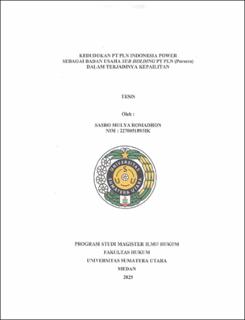Kedudukan PT PLN Indonesia Power sebagai Badan Usaha Sub Holding PT PLN (Persero) Dalam Terjadinya Kepailitan
Company of PT PLN (Persero) in the Event of Bankruptcy

Date
2025Author
Romadhon, Sasro Mulya
Advisor(s)
Sutiarnoto
Siregar, Mahmul
Metadata
Show full item recordAbstract
The establishment of holding and sub-holding structures within State-Owned Enterpries (SOEs) has created legal uncertainty regarding the status of former SOEs and subsidiaries whose organizational from has been transformed into sub-holdings. This condition leads to unclear legal standing in corporate restructuring. This study examines the legal position of PT PLN Indonesia Power as a sub-holding company of PT PLN (Persero) under the State-Owned Enterprises Law and the Limited Liability Company Law. It also analyzes the implications of bankruptcy involving PT PLN Indonesia Power under the Bankruptcy and Suspension of Debt Payment Obligations Law, and the legal consequensces concerning assets owned by PT PLN (Persero) that are controlled by PT PLN Indonesia Power during bankruptcy proceedings.
The research adopts a normative legal approach with a desciptive-analytical method. It applies statutory, conceptual, and case-based approaches. The data used are secondary data comprising primary, secondary, and tertiary legal materials, collected through library research and analyzed qualitatively using deductive reasoning.
The results show that PT PLN Indonesia Power, as a sub-holding company of PT PLN (Persero), qualifies as an ordinary limited liability company and cannot be classified as a State-Owned Enterprise. Bankruptcy proceedings involving PT PLN Indonesia Power are not regarded as bankruptcy of an SOE. In accordance with the principle of legal certainty, assets owned by PT PLN (Persero) but managed by PLN Indonesia Power should not be automatically treated as assets of the sub-holding company. Lack of legal clarity regarding asset ownership can affect the protection of PT PLN’s assets during bankruptcy. This study concludes that regulatory harmonization is needed to clarify the legal standing of sub-holding companies in the national legal framework. Clear documentation and formal agreements regarding asset ownership between holding and sub-holding entities are essential to provide legal certainty in bankruptcy scenarios.
Collections
- Master Theses [1926]
